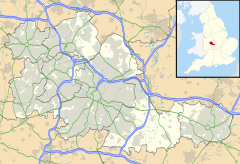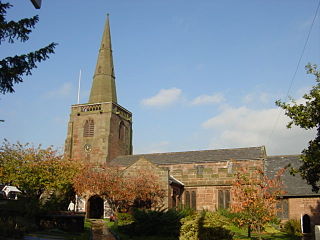
All Saints' Church, is in Childwall, Liverpool, England. It is recorded in the National Heritage List for England as a designated Grade I listed building, and is the only medieval church remaining in the Metropolitan borough of Liverpool. It is an active Anglican parish church in the diocese of Liverpool, the archdeaconry of Liverpool and the deanery of Liverpool South – Childwall.
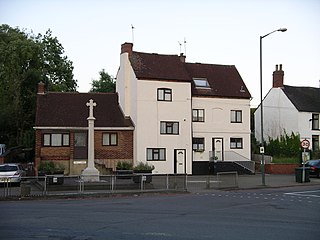
Walsgrave on Sowe, or simply Walsgrave, is a suburban district situated approximately 3.5 miles (5.6 km) north-east of central Coventry, in the county of the West Midlands, central England. Although it now experiences very little flooding, it was built on marshlands. However, due to urban growth, it is now an outer suburb of Coventry, south-west of the villages of Ansty and Shilton. Walsgrave on Sowe neighbours the Potters Green, Clifford Park, Woodway Park, Wyken, Henley Green and Mount Pleasant areas of Coventry, and is in the Henley ward of the city, although Walsgrave-on-Sowe was formerly in the Wyken Ward prior to ward changes made in 2003 by the Local Government Boundary Commission for England (LGBCE).

St Nicholas Church is a Church of England parish church in Kenilworth, Warwickshire, England.

St Wilfrid's Church is the parish church of Grappenhall, in the Borough of Warrington in Cheshire, England. It is designated by Historic England as a Grade I listed building. It is an active Anglican church in the diocese of Chester, the archdeaconry of Chester and the deanery of Great Budworth.

St Mary's Church is an Anglican parish church in the village of Newbold Astbury, Cheshire, England. It is recorded in the National Heritage List for England as a designated Grade I listed building, and its architecture has been praised by a number of writers.
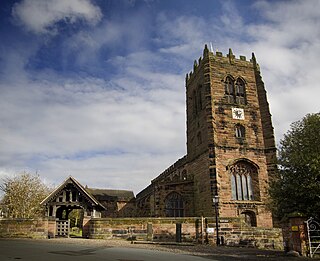
St Mary and All Saints Church is in the centre of the village of Great Budworth, Cheshire, England. It is an active Anglican parish church in the diocese of Chester, the archdeaconry of Chester and the deanery of Great Budworth. The church is recorded in the National Heritage List for England as a designated Grade I listed building. Clifton-Taylor includes it in his list of 'best' English parish churches. Richards describes it as "one of the finest examples of ecclesiastical architecture remaining in Cheshire". The authors of the Buildings of England series express the opinion that it is "one of the most satisfactory Perpendicular churches of Cheshire and its setting brings its qualities out to perfection".

St Mary's Church is an active Anglican parish church located in Monk's Lane, Acton, a village to the west of Nantwich, Cheshire, England. Since 1967 it has been designated a Grade I listed building. A church has been present on this site since before the time of the Domesday Survey. The tower is the oldest in Cheshire, although it had to be largely rebuilt after it fell in 1757. One unusual feature of the interior of the church is that the old stone seating around its sides has been retained. In the south aisle are some ancient carved stones dating back to the Norman era. The architectural historian Alec Clifton-Taylor includes the church in his list of 'best' English parish churches. In the churchyard is a tall 17th-century sundial. The church is an active Anglican parish church in the diocese of Chester, the archdeaconry of Macclesfield and the deanery of Nantwich. Its benefice is united with those of St David, Wettenhall, St Oswald, Worleston, and St Bartholomew, Church Minshull.

The Church of St Mary the Virgin is in Leek Road, Bosley, Cheshire, England. It is recorded in the National Heritage List for England as a designated Grade II* listed building. It is an active Anglican parish church in the diocese of Chester, the archdeaconry of Macclesfield, and the deanery of Macclesfield. Its benefice is combined with those of St Michael, North Rode, St Michael, Wincle, and St Saviour, Wildboarclough.

St Mary's Church is in the small settlement of Bruera, which lies between the villages of Saighton and Aldford, in Cheshire, England. It is recorded in the National Heritage List for England as a designated Grade II* listed building. The church contains Norman elements, but it has been subjected to alterations and modifications, particularly in 1896. It is an active Anglican parish church in the diocese of Chester, the archdeaconry of Chester and the deanery of Malpas. Its benefice is combined with those of St Peter, Waverton, and St John the Baptist, Aldford.

The Church of St Mary the Virgin is in the village of Bowdon near Altrincham, Greater Manchester, England. It is recorded in the National Heritage List for England as a designated Grade II* listed building. It is an active Anglican parish church in the diocese of Chester, the archdeaconry of Macclesfield and the deanery of Bowdon.

The Parish Church of St Mary the Virgin is a Church of England parish church in Leigh, Greater Manchester, England. It is a member of the Salford & Leigh deanery in the archdeaconry of Salford, diocese of Manchester. It is recorded in the National Heritage List for England as a designated Grade II* listed building.

St Kentigern's Church,, is in the village of Caldbeck, Cumbria, England. It is an active Anglican parish church in the deanery of Carlisle, the archdeaconry of Carlisle and the diocese of Carlisle. The church is recorded in the National Heritage List for England as a designated Grade I listed building. It is dedicated to Saint Kentigern, whose alternative name is Saint Mungo; hence the church's alternative title of Caldbeck, St Mungo.

The Church of St Mary and All Saints is an Anglican church in the village of Whalley, Lancashire, England. It is an active parish church in the Diocese of Blackburn. A church probably existed on the site in Anglo-Saxon times and the current building dates from the 13th century. It is recorded in the National Heritage List for England as a designated Grade I listed building.

The Old Church of St Nidan, Llanidan is a medieval church in the community of Llanidan, in Anglesey, North Wales, close to the Menai Strait. The first church on the site was established in the 7th century by St Nidan, the confessor of the monastery at Penmon, Anglesey, but the oldest parts of the present structure, now closed and partly ruined, date from the 14th century. In about 1500 the church was enlarged by the addition of a second nave on the north side, separated from the earlier nave by an arcade of six arches. During 1839 till 1843 a new church was built nearby to serve the local community, partly due to the cost of repairing the old church. Much of the building was subsequently demolished, leaving only part of the western end and the central arcade. The decision was condemned at the time by Harry Longueville Jones, a clergyman and antiquarian, who lamented the "melancholy fate" of what he called "one of the largest and most important [churches] in the island of Anglesey". Other appreciative comments have been made about the church both before and after its partial demolition.

Caludon Castle is a Scheduled Ancient Monument and Grade I listed building in Coventry, in the West Midlands of England. A second moated site 190 metres (620 ft) to the south is a Scheduled Ancient Monument in its own right. The castle is now a ruin, and all that remains is a large fragment of sandstone wall. What remains of the estate is now an urban park, owned and run by Coventry City Council, but much of it was sold and developed into housing estates in the early 20th century.
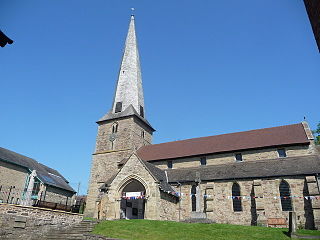
St Mary's Church is on Church Street, Cleobury Mortimer, Shropshire, England. It is an active Anglican parish church in the deanery of Ludlow, the archdeaconry of Ludlow, and the diocese of Hereford. Its benefice is united with those of six local parishes to form the Cleobury Benefice. The church is recorded in the National Heritage List for England as a designated Grade I listed building. It is notable for its shingled twisted spire.

St Mary's Church is in the village of Edstaston, in the civil parish of Wem Rural, Shropshire, England. It is an active Anglican parish church in the deanery of Wem and Whitchurch, the archdeaconry of Salop, and the diocese of Lichfield. Its benefice is united with those of St Chad, Prees, Holy Emmanuel, Fauls, Christ Church, Tilstock, and St Mary, Whixall. The church is recorded in the National Heritage List for England as a designated Grade I listed building. It is described as "one of the most complete Romanesque buildings in Shropshire".

The Church of St John the Evangelist is a Grade I listed Church of England parish church dedicated to John the Evangelist, in Corby Glen, Lincolnshire, England. The church is 9 miles (14 km) south-east of Grantham, and in the South Kesteven Lincolnshire Vales. It is noted in particular for its 14th- and 15th-century medieval wall paintings.

St Mary's Church is in Walton, Liverpool, Merseyside, England. It is an active Anglican parish church in the deanery of Walton, the archdeaconry of Liverpool and the diocese of Liverpool. Its benefice is united with those of St Nathanael, Walton-on-the-Hill, and St Aidan, Walton-on-the-Hill, to form the Walton Team Ministry. The church is recorded in the National Heritage List for England as a designated Grade II listed building.

The Church of St. Thomas à Becket is the Church of England parish church of Box, Wiltshire, in south-west England. It is one of a number of churches named after Thomas Becket following his martyrdom. The church has 12th-century origins and was substantially remodelled in the 14th, 15th, 18th and 19th centuries. It is a Grade I listed building.



